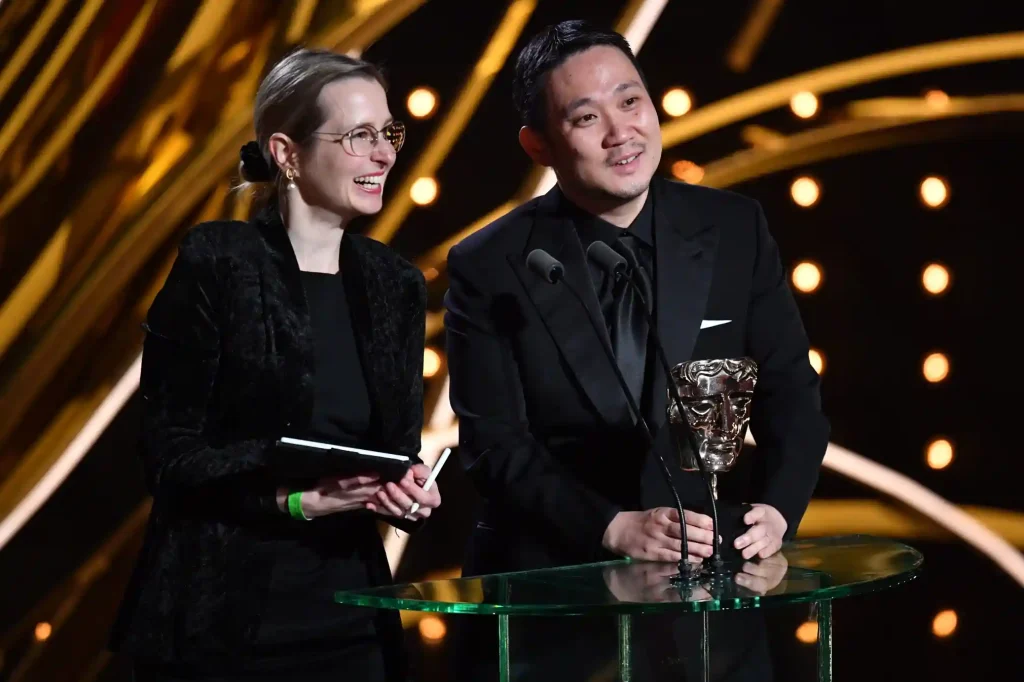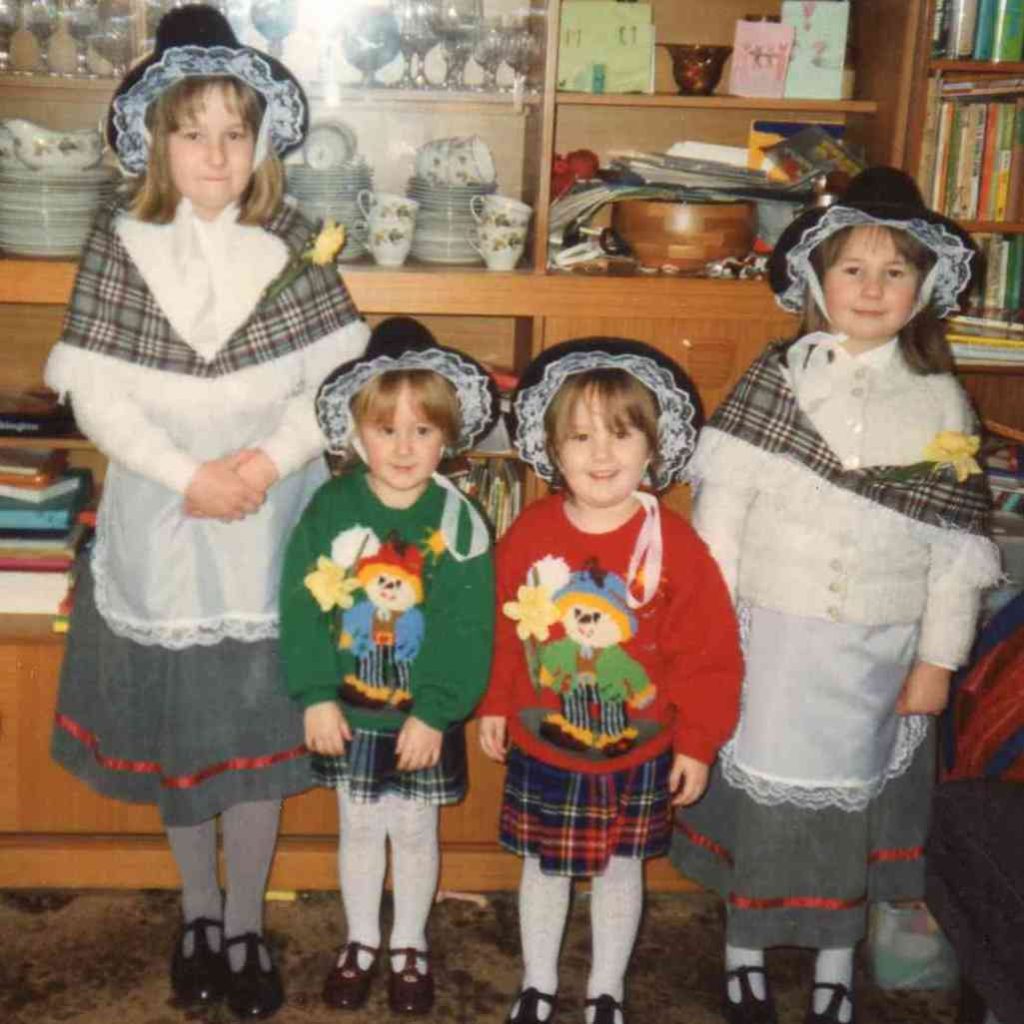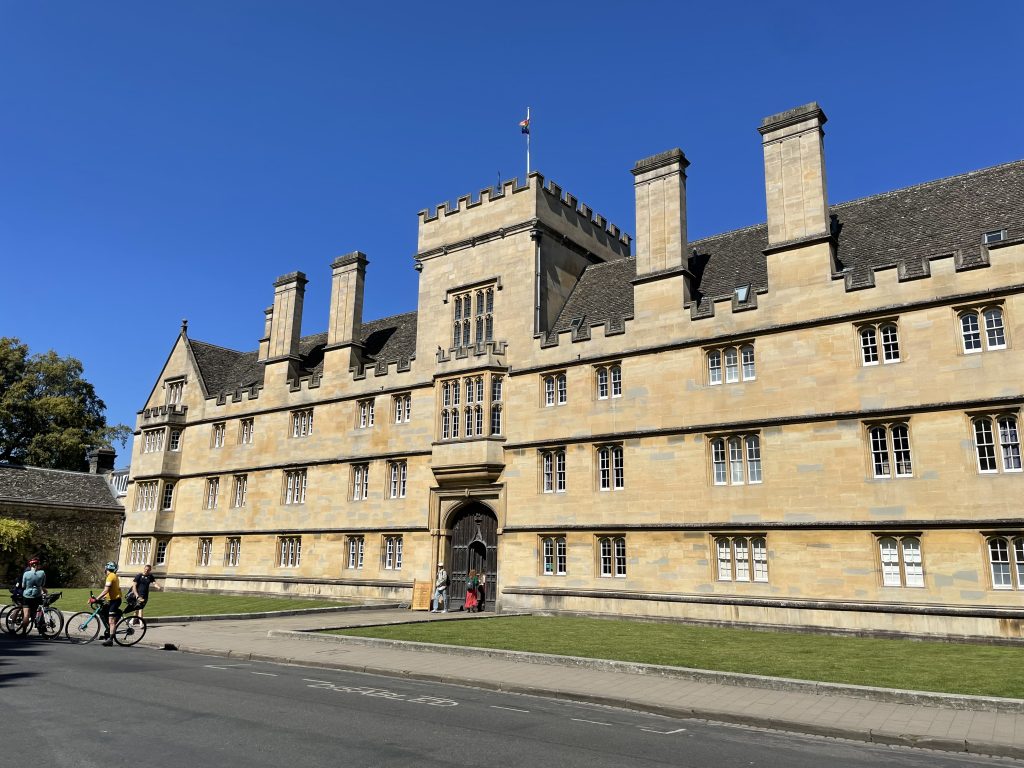The Blonde Interpreter – Part 1
I’m a celebrity. At least, that is, according to my old Sunday school teacher, my drama teacher, my Dad’s financial adviser, or anyone from the village where I grew up. The reason for my sudden fame? My approximately 3 minutes on national television back in March last year when I stood by the side of Ryusuke Hamaguchi and interpreted his acceptance speech on receiving the award for Best Film Not in the English Language for Drive My Car at the 75th British Academy Film Awards.

My old interpreting teacher once reminded me that when I started out on this path, she asked me what kind of interpreting I would like to do. Back then, I only had a vague notion of the possibilities open to me. “I’d like to help people,” I replied, “Maybe interpreting in hospitals?” A pause, and then the truth, the dream. “Or for entertainment… maybe film?” There it was. Even then, the seed of an ambition that, through a combination of hard work and being in the right place at the right time, has begun to seem more and more achievable.
It was, I think, on the Wednesday that I got an email from the UK distributor of Drive My Car confirming that I would be interpreting for the director at the ceremony on the Sunday. I proceeded to panic about the thing that would surely be top of anybody’s mind in my situation… what to wear? After many trying-on sessions and second opinions, I fell back on an all-black outfit that had been in my wardrobe for at least ten years.
The morning of the big day was about strawberries. An event on strawberry farming technology was just the warm-up I needed before hot-footing it to the Royal Albert Hall just down the road. After picking up my accreditation and inhaling a sandwich, I made it to the red carpet just in time to greet the director… or I would have, had I not been sent to the wrong end of the red carpet. Cue an embarrassed half-walk half-run the wrong way down/up the red carpet. Forty minutes later, my party arrives. They are also at the wrong end of the red carpet.
The atmosphere in the Hall is thrilling. It feels like a true celebration. Everyone is nervous, everyone is excited, and, contrary to what a lot of people believe, no one knows who’s going to win. There wasn’t a seat for the interpreter, so when they announced the winner I was crouching in the aisle, being scolded by the usher for being a fire hazard. No matter. The moment arrived. The winner was announced. And the winner is…. Drive My Car.
I have stood on one or two stages in my time, but I don’t think my hand has ever shaken quite so much… which doesn’t help when you’re trying to take notes. Neither is the countdown clock, invisible from the audience but all too obvious from the stage, conducive to a calm delivery. Which is to say that, despite numerous hanseiten, I have persuaded myself that I did the best I could in the circumstances.
My experience with languages began early, though not as early as some, and not with Japanese. At the age of seven, I moved with my family from a town just outside London to a village in rural Wales. It comes as a surprise to many that Wales, although part of the UK, has its own language. Even those aware of that fact are often surprised when I tell them that in large parts of the country, Welsh is many people’s first language. So it was in the Gwendraeth Valley. Lessons in the local village school that my sisters and I attended were taught entirely in Welsh, and it was Welsh my new friends spoke in the playground. I remember sitting alone at the front of the class, listening to cassette tapes, “repeating-after-me”, and copying out story books, pictures and all.
How different can Welsh and English really be? I hear you ask. Allow me to give you a taster.
Good morning Bore da /ˌbɔrɛ ˈdaː/
Thank you Diolch /ˈdiː.ɔlχ/
Please Os gwelwch yn dda /ɔs ˌɡwɛlʊχ ən ˈðaː/
Welcome Croeso /ˈkrɔi̯sɔ/
(IPA notation taken from Wikipedia)
My sisters and I learnt quickly enough. Quickly enough to go on to the local “bilingual” secondary school rather than the English-speaking one. “Bilingual” meant that English was not to be spoken outside of English, science and maths lessons. English was the language of the naughty kids. Nowadays I’m embarrassed to say that my Welsh is decidedly rusty through lack of use. I make a stab at conversing with people in the village where my parents still live, but my vocabulary is that of a sixteen-year-old, my grammar is shocking, and every other sentence seems to contain a rogue Japanese word.

My Welsh may be abysmal now, but back then it was good enough to get me my first interpreting job…. for my dad. Although we lived in a Welsh-speaking area, all of its inhabitants also spoke English, so unlike many children who grew up bilingual, there was no need for us girls to interpret for parents’ evenings, doctor’s appointments etc. My father, however, soon became a member of the Community Council, whose meetings were held entirely in Welsh. A local charity was responsible for providing a Welsh-English simultaneous interpreter just for my dad. I never met her, and never gave her much thought until she was off sick one month. “You speak Welsh,” said my Dad, “You can do it.” I couldn’t, of course. But I did try, and if I’d known then that in twenty-five years’ time I would be dragging up the memory of my first interpreting experience for this JACI article, I might have paid more attention.
At secondary school I studied French, which I loved and was good at. I felt rather put out, however, when I learnt that children in schools in England got to study two foreign languages. We already had two first languages: English and Welsh, so there was only room for one more in our timetable. I rectified this in sixth form, when I moved schools so that I could take up Italian.
When it came to choosing what to study at university, I knew I wanted to learn another language, but which one? Nothing European, nothing too similar to English, challenging, yet not so obscure as to be of no practical use when it came to finding a job in the future. Japanese seemed to tick all the boxes. I knew nothing at all about the country, had never met a Japanese person or tried Japanese food, but I was intrigued by kanji and it was meant to be easier to pronounce than Chinese. I am often asked why I decided to study Japanese, and am slightly embarrassed that this is the best explanation I can offer. Fortunately for me, it seems to have been a good decision!
They sent us our first lot of textbooks about a month before the start of term with the instruction to learn hiragana and katakana before arriving in Oxford. Kana were combined into words, meaning that before I could string a sentence together, one of my first Japanese words was “suika”. That’s the fruit, not the travel card. Guessing the English word behind the katakana spelling was a fun game, and one that not all of my classmates were prepared for; I quickly discovered that even Oxford students don’t always do their homework.
Most days we had classes in some combination of reading and writing, kanji and conversation. Our language teachers were young Japanese ladies whom us first-years instantly warmed to. I don’t remember much about how we studied, except that kanji were memorised the old-school way, by rote, and often as an afterthought at two in the morning. Language had been my main motivation in choosing the course at Oxford, but of course we had to study other things, too. Almost immediately, we began a whistlestop tour of Japanese history, starting way back in Jōmon times. Along the way, we took in art, literature, theatre, culture, politics and linguistics. I even took a course in Korean for a year. And of course, this being Oxford, we had to study classical Japanese. Now and then something comes up in a translation or when reading that harks back to those days poring over extracts from “Tsurezuregusa” trying to figure out verb endings, and I think how useful it might have been had I managed to remember any of it.

My first trip to Japan could have been where it all fell apart. After all, I had never been further than France before, and my only taste of Japanese food had been when one of our teachers invited us to her house for okonomiyaki. This was in preparation for the third term of the first year, when were thrown in at the deep end with a term at Kwansei Gakuin University in Hyogo Prefecture. For three months I stayed with the most wonderful homestay family and probably learnt more Japanese from them than I did in class, where I was studying alongside my Oxford classmates and other exchange students and the common language was English. My hosts treated me like one of the family; they took me to onsen, to restaurants, to karaoke, and for hanami. We are in touch to this day, and I consider it the greatest honour that they “blame” me for their eldest daughter, who was just thirteen when I stayed with them, getting a taste for all things foreign and ultimately marrying a Mexican and moving to San Francisco with him.
All in all, my first trip to Japan was a huge success, and reassured me that I had made the right choice. The only problem was that I, along with most of my classmates, discovered I liked Japanese food (and, let’s face it, chuhai) rather too much, and came back significantly heavier than I went out!
I mentioned studying kanji at 2am. This, of course, was entirely my own fault. Yes, the workload at Oxford was heavy, but the truth is I was having far too much fun outside of my studies. At sixth form college I had chosen drama as one of my four A-level subjects, and since the age of fourteen or so I had been involved in school plays, drama competitions, and the local youth opera. At Oxford there were multiple performances taking place every week in theatres large and small throughout the city, and the vast majority of them were produced, directed, managed and performed by students. I wasted no time in getting involved, and ended up performing in one, if not two, plays per term. I also joined, at various points, the college orchestra, an a cappella group, and the college chapel choir for good measure. Hardly surprising that kanji took a back seat on occasion!
It may seem like a side note, but for me my days performing in Shakespeare, musicals, and comedy were almost as much of a preparation for my future career as my formal Japanese studies. Rarely am I fazed by standing on stage in front of an audience (the earlier BAFTA example being the exception – time to get used to bigger stages!), and somehow I seem to have gravitated towards this kind of work. I know many conference interpreters dread stepping out of the booth and into the limelight, but I thrive on feedback from an audience; making sure the crowd laughs where the speaker expects them to is one of the most satisfying feelings. I’ll talk more about the kind of jobs I do in a later instalment, but for now suffice it to say that I believe my wasted youth was far from wasted.
Why “The Blonde Interpreter”?
I always found it amusing that the moment I arrived in Japan I was labelled kinpatsu when, to my mind, I was far from blonde. I had always had the most boring, mousy-brown hair that no-one in the Western world would have associated with “having more fun.” But here, in Japan, I was blonde!
Fast forward twenty-three years, and for a decade now I have dyed my hair, meaning kinpatsu is now a more accurate description. As you may know, “blonde”, in a certain context, can have negative connotations. For me, though, it’s my differentiator – something (one of the many things) that marks me out as not being Japanese. And even if I fall out of love with bleach, I know that as far as Japan is concerned, I will always be kinpatsu.

Bethan Jones
Bethan is a freelance Japanese-English interpreter based in London, UK. She has been “full-time freelance” since 2010 and alongside interpreting and the odd bit of translation, dabbles in presenting for TV and live events. Her interpreting work spans the areas of business, culture, and beyond, and she has been fortunate enough to work with well-known figures such as Hirokazu Kore-eda, Ryusuke Hamaguchi, Makoto Shinkai, Sayaka Murata and Marie Kondo. https://bethanjonesinterpreter.com/
(Photo credit: Eddie Judd Photography)